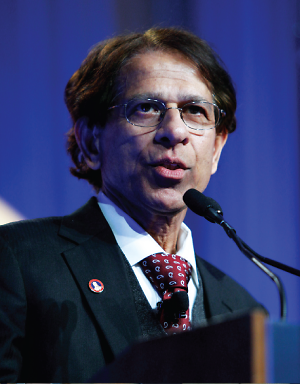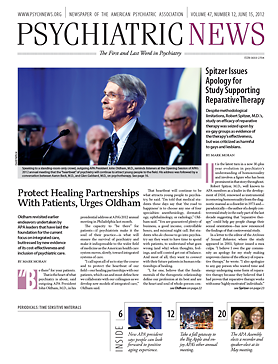“Positive psychiatry” that aims not just to reduce psychiatric symptoms but to help patients grow and flourish is the future, said incoming APA President Dilip Jeste, M.D., at the Opening Session of APA’s 2012 annual meeting in Philadelphia.
Jeste, who is the Estelle and Edgar Levi Chair in Aging and director of the Sam and Rose Stein Institute for Research on Aging at the University of California, San Diego, said this emerging form of “positive psychiatry” will be especially pertinent to a graying society. In his remarks he introduced the theme for his presidential year: “Pursuing Wellness Across the Lifespan.”
“The world population is aging,” he said. “The number of people over 65 will double in the next 20 to 25 years. Some people disparagingly dub this the Silver Tsunami, as if it’s a disaster waiting to happen.
“I strongly disagree with this view,” Jeste continued. “I see the demographic shift, not as a Silver Tsunami, but as a Golden Wave, or a Golden Revolution, if you will. Older people are a major resource and not a drain on the society.”
Jeste said that growing numbers of seniors are functioning at a very high level and contributing to society in important ways. “This type of successful aging is no longer a grandma’s tale or a feel-good TV show,” he said. “It is now an evidence-based scientific fact. Some of the most exciting neuroscience research during the past 15 to 20 years has shown conclusive evidence of neuroplasticity of aging.
“Studies across species have shown that brain growth and development are not restricted to childhood, but continue into old age. Blood vessels, synapses, even neurons can grow in certain parts of the brain—provided there is optimal psychosocial and physical stimulation.”
Jeste pointed out that successful aging is not a fantasy; it is already fact. And the path to reaching it is not solely caloric restriction and physical activity. “It is also through promoting and enhancing resilience, optimism, wisdom, and social engagement through our psychotherapeutic intervention,” he said.
Moreover, preventive psychiatry will not be an oxymoron, Jeste told psychiatrists. “More than any other medical specialty, psychiatry focuses on interventions aimed at behavior change,” he said. “Our psychotherapies will, therefore, come to incorporate these positive psychological traits for people with or without mental illness.” (See
Positive Psychiatry.)
The incoming APA president, who served on the DSM-5 Task Force and was chair of the Neurocognitive Disorders Work Group until his election as president-elect in 2011, also drew attention to the rigorous process involved in the development of the new diagnostic manual.
“We take any criticism of DSM-5 seriously because we want it to be the best possible manual of psychiatric diagnoses today,” Jeste said. “Several hundred psychiatrists and nonpsychiatrists from various countries have spent, pro-bono, tens of thousands of hours in helping develop DSM-5. There is a rigorous review process through the Scientific Review Committee, as well as the Clinical and Public Health Review Committee.
“The field trial results are currently being analyzed,” he said. “The APA Board of Trustees will take into account all of these data as well as the public comments in deciding about the approval of various DSM-5 categories and criteria.”
Jeste, who grew up in India and spoke of his gratitude and awe at becoming president of APA (“While I was in psychiatric training in India, everyone there considered APA as a celestial body”) also spoke of his hope to expand the international diversity of APA.
“APA already is a big tent, but I would like to expand it even further by getting more international members, subspecialists, younger psychiatrists, and those from diverse backgrounds,” he said. “One of my areas of focus will be international membership. APA is truly a global psychiatric organization. I would like to increase our efforts in promoting international membership of APA.
“APA also can contribute significantly to educational activities in various other countries, especially the developing countries where there is a serious shortage of psychiatrists,” Jeste said.


